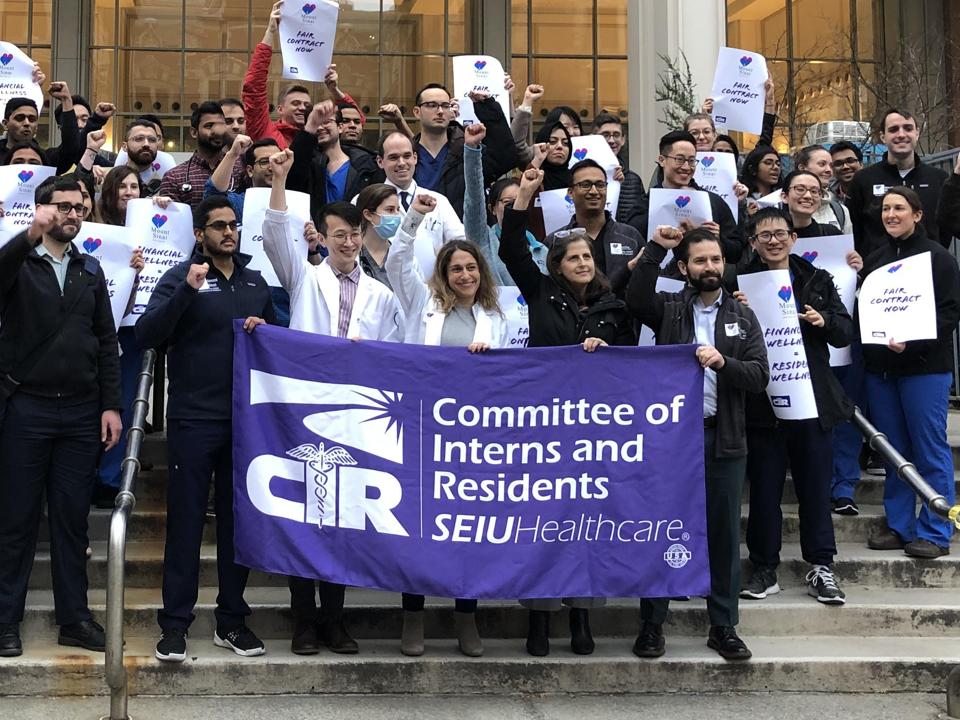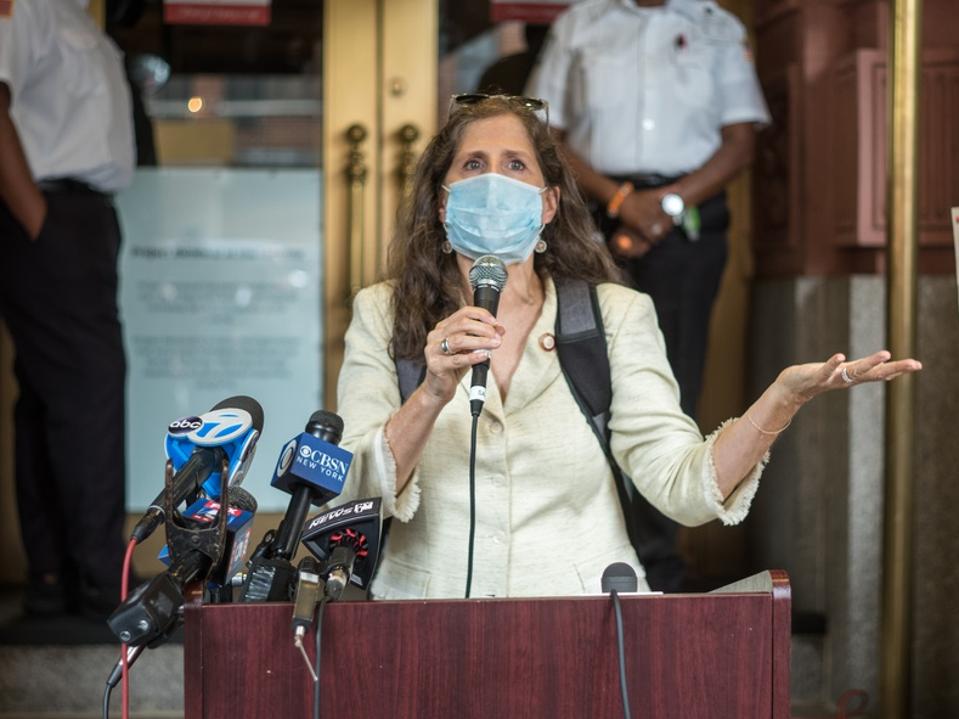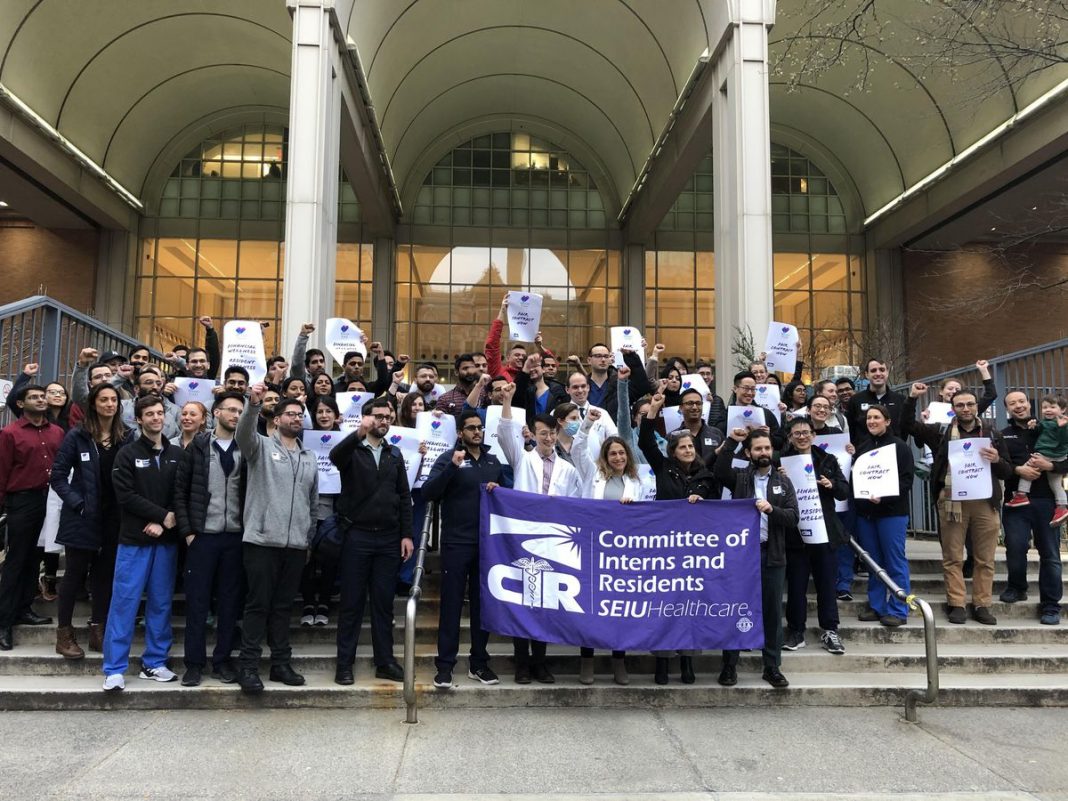
On February 11, a bill introduced by New York City (NYC) City Council Member Helen Rosenthal, seen … [+]
COURTESY OF NYC CITY COUNCIL MEMBER HELEN ROSENTHAL’S OFFICE AND COMMITTEE OF INTERNS & RESIDENTS (CIR)
Take a wild guess as to what happened at a press conference on February 11 to discuss a New York City (NYC) bill aimed at protecting health care professionals from harassment and discrimination.
The press conference was Zoom-bombed with pornography. Yes, you heard that correctly. A press conference about preventing harassment suffered harassment, some very explicit harassment.
Here’s what Stella Safo, MD, MPH, an HIV primary care physician and Assistant Professor of Medicine at the Icahn School of Medicine at Mount Sinai tweeted:
The press conference was in advance of a vote later that day by the New York City Council on a bill sponsored by NYC Council Member Helen Rosenthal, MPH. Rosenthal, who is also the Chair of the NYC Committee on Women and Gender Equity, had introduced the legislation that, if passed, would establish an Advisory Board for NYC’s hospitals. As I covered for Forbes last September, the Advisory Board would advise the Mayor and City Council on how to keep healthcare workers in NYC safer from harassment and discrimination at their workplaces.
The Zoom-bomb was almost like an Exhibit A on why such a Board is needed. The incident pushed the press conference from a public to a private line. But it didn’t prevent the bill from passing that afternoon, as Safo subsequently tweeted:
This newly passed legislation means that NYC will be setting up an Advisory Board to regularly monitor, report on, and address any issues of gender or racial harassment and discrimination that emerge among the health care institutions in the city.
“I am so thrilled that the Speaker of the council moved the bill through quickly with nearly unanimous support,” said Rosenthal. “By having to produce a report every year, this will shine a spotlight on the issues of racial and misogynistic discrimination every year in perpetuity.” She described how the Board would “have to meet quarterly while keeping records of the proceedings. Not only would the report be sent to the Mayor’s council and posted to the Department of Health website, it would also have to be shared with a hospital trade association.”

Another resolution sponsored by New York City Council Member Helen Rosenthal, seen here at press … [+]
Getty Images
Now, a key aspect of this Board is that it can’t be controlled by hospital and medical school leadership in NYC. That could be like putting the Cookie Monster in charge of a cookie jar defense system. The Board members won’t be CEOs of hospitals, Deans of medical schools, or someone hired by such leaders. Just because people have the word “equity”, “inclusion”, “unity”, or “help me, help you” in their titles doesn’t guarantee that it’s necessarily their goal or motivation. Instead, members will have to be completely independent from health care institution leadership and represent the people that the board is trying to protect.
“Advisory board members will be from vulnerable groups,” explained Safo. She described how having Board members who are actually interested in taking true action will help prevent the “potential problem of simply meeting to death. We are trying to do serious grass roots democracy to make a difference.”
Such a third party board is important for medical and other health care students and professionals who have little recourse when suffering harassment and discrimination. The concern is that anyone employed by a medical school or other health institution such as ombudspersons, equity offices, and human resources personnel may serve more like a CYA channel for the institution rather . In this case, CYA wouldn’t mean “candies, yams, and apples” but instead “cover your” and insert a word for behind that rhymes with gas.
Without such an independent Board, “the heads of the hospitals and medical schools set the tone,” said Rosenthal. “They determine whether the HR department really investigates a complaint or not.”
That’s not the only problem. “There’s also the fear of the retaliation,” warned Natasha Anushri Anandaraja, MD, MPH, pediatrician and public health physician. Anandaraja described what happened after she and her faculty colleagues complained about suffering discrimination and harassment at the Icahn School of Medicine at Mount Sinai. “Reception through human resources was not friendly and responsive. In fact, we were retaliated against. There’s a lack of a safe and just reporting system.”
Anandaraja was referring to a lawsuit filed back in the Spring of 2019 that I described previously for Forbes. Ann Olivarius, MBA, JD, DPhil, a Senior Partner for McAllister Olivarius, is representing the plaintiffs in the case. According to Olivarius, the case has stalled. Mount Sinai has filed a motion to dismiss the case, and they are waiting for the judge to rule on this motion. “Mount Sinai could still settle with plaintiffs,” said Olviarius. “They could talk to do constructive things.” She also mentioned how similar cases with White male plaintiffs have been solved very fast in the past. Yet, by contrast, with women and persons of color as plaintiffs, nothing has really happened.
Note: I have reached out to Icahn School of Medicine at Mount Sinai prior to publishing this article for comments on this case and will update this story accordingly.
February 11 also saw the passage of a resolution sponsored by Rosenthal that urges medical schools in New York State to include implicit bias training in their curriculum. This wouldn’t be training people on how to have implicit bias. There’s plenty of implicit bias going around already. Pretty much everyone who isn’t a cinder block has some degree of implicit bias. You undoubtedly have bias in whom you prefer and avoid, favor and hinder, like and dislike something without real justification. When you close your eyes and think of someone attractive, smart, or talented, you will imagine someone of a particular sex, race, ethnicity, or other socio-demographic group. The same is true when you think about negative characteristics, like some unattractive, not smart, or unlikeable. Explicit bias is doing this knowingly like deliberately avoiding Asians or Blacks or hiring only men. Implicit bias is much more insidious and difficult to detect and address. It’s when people have biases without their even knowing or acknowledging such biases.
Discrimination against and harassment of medical students, physicians, and other health professionals are important patient care issues as well. “What happens when your boss says something disparaging of you in front of the patient,” explained Rosenthal. “And then you are then expected to treat the patient. How will the patient then view you? If your doctors are not respected then it harder to have good patient outcomes.” Also, as Safo indicated, what happens if a medical student or doctor sees patients treated in ways that are not ethical such as being discriminated against or harassed. People may be afraid of speaking out amidst an institutional culture that doesn’t rapidly address all discrimination and harassment. “Maternal mortality is a great example,” said Rosenthal. “Why do Black women die at a higher rate? Discrimination is part of that. Misogyny is part of that. We need to make doctors aware of their implicit and explicit biases.”
NYC is kind of a big city. So any bill that passes can be kind of a big deal. The passage of this new legislation could subsequently influence what happens throughout the country. “Advocates can use the passage of these ideas to lobby their localities,” said Rosenthal. “NYC is a vanguard. There is now comparable bills at the state level”
The newest NYC legislation is a step towards giving medical students, physicians, and other health care professionals suffering discrimination or harassment another more independent channel that will put them less at risk for retaliation. “We are asking for deeper systemic change to the institutions,” Anandaraja explained. “Not only can we not speak out about discrimination that doctors and medical students are facing. Patients may be treated in ways that are not ethical but are afraid of speaking out. It puts patients in the way of harm.”
Here is what @EquityNowSinai, the group that has lodged complaints against Mount Sinai, tweeted about Zoom-bombing on February 11:
The newest NYC legislation also further elevates such conversations and about what changes need to be made. Rosenthal said the following about Anandaraja, “Anu always says, ‘speak up about it, speak about it, and then speak about it,’” and emphasized the importance of regularly talking about harassment and discrimination because “the hospital would like to bury such issues under a rug.” Putting anything under a rug is rarely a good approach with the possible exception of a rug pad. After all, as anyone who has put some stroganoff under a carpet can tell you, anything under a rug will eventually end up making a bigger and bigger mess for everyone someday.




